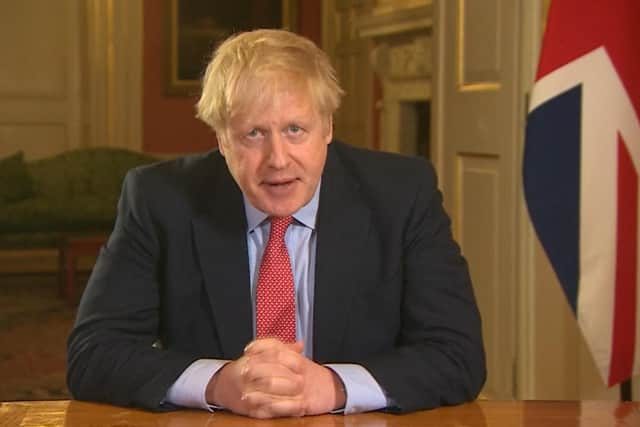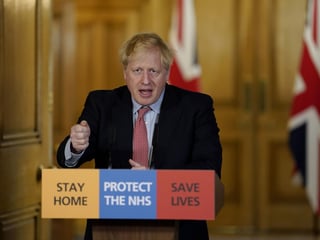Coronavirus: Who is running the government after Boris Johnson is admitted to ICU over Covid-19? Here's what you need to know
and live on Freeview channel 276
Boris Johnson revealed on Friday, March 27, that he was diagnosed with the virus after developing a persistent cough and a temperature.
He remained in self-isolation for over a week but was then admitted to hospital on Sunday night.
Advertisement
Hide AdAdvertisement
Hide AdThe Prime Minister was moved to the ICU on Monday after his symptoms became worse.


But if the Prime Minister has coronavirus who is running the country?
Here’s what you need to know:
Is Boris Johnson still in charge?
In the post announcing that he has coronavirus, Mr Johnson said that he will be working from home.
He explained: ‘I'm working from home and self-isolating and that's entirely the right thing to do.
Advertisement
Hide AdAdvertisement
Hide Ad‘But, be in no doubt that I can continue thanks to the wizardry of modern technology to communicate with all my top team to lead the national fightback against coronavirus.
‘I want to thank everybody involved and, of course, our amazing NHS staff.’
The Prime Minister continued to work from home throughout the last week.
However he is now in the ICU.
A Number 10 spokesman said: ‘Over the course of this afternoon, the condition of the Prime Minister has worsened and, on the advice of his medical team, he has been moved to the intensive care unit at the hospital.’
Who is in charge now Boris Johnson is in ICU?
Advertisement
Hide AdAdvertisement
Hide AdDominic Raab will take charge of the Government's response to the coronavirus crisis after the Prime Minister was transferred to intensive care.
The Conservative Party leader ceded control ‘where necessary’ to Foreign Secretary and First Secretary of State Mr Raab, who will deputise for the PM.
In a statement recorded after Mr Johnson's admission, Mr Raab said: ‘The Government's business will continue.
‘The Prime Minister is in safe hands with that brilliant team at St Thomas' Hospital, and the focus of the Government will continue to be on making sure that the Prime Minister's direction, all the plans for making sure that we can defeat coronavirus and can pull the country through this challenge, will be taken forward.’
Advertisement
Hide AdAdvertisement
Hide AdCoronavirus: the facts
What is coronavirus?
Covid-19 is a respiratory illness that can affect lungs and airways. It is caused by a virus called coronavirus.
What caused coronavirus?
The outbreak started in Wuhan in China in December 2019 and it is thought that the virus, like others of its kind, has come from animals.
How is it spread?
As this is such a new illness, experts still aren’t sure how it is spread. But similar viruses are spread in cough droplets. Therefore covering your nose and mouth when sneezing and coughing, and disposing of used tissues straight away is advised. Viruses like coronavirus cannot live outside the body for very long.
What are the symptoms?
Advertisement
Hide AdAdvertisement
Hide AdThe NHS states that the symptoms are: a dry cough, high temperature and shortness of breath - but these symptoms do not necessarily mean you have the illness. Look out for flu-like symptoms, such as aches and pains, nasal congestion, runny nose and a sore throat. It’s important to remember that some people may become infected but won’t develop any symptoms or feel unwell.
What precautions can be taken?
Washing your hands with soap and water thoroughly. The NHS also advises to cover your mouth and nose with a tissue or your sleeve (not your hands) when you cough or sneeze; put used tissues in the bin immediately and try to avoid close contact with people who are unwell. Also avoiding touching eyes, nose and mouth unless your hands are clean.
Sources: World Health Organisation and NHS
Comment Guidelines
National World encourages reader discussion on our stories. User feedback, insights and back-and-forth exchanges add a rich layer of context to reporting. Please review our Community Guidelines before commenting.
